:max_bytes(150000):strip_icc()/oura-ring-2-6e4a655bf1204877b33c125fe0f2fff4.jpg)
"Podcast Introscape Audiophile's Melodic Treasure Trove"

Podcast Introscape: Audiophile’s Melodic Treasure Trove
Adding music and sound effects is a great way to polish your podcast episodes—especially the podcast intro with a piece of fantastic music. In this article, we will guide you on how to choose music and where to find your best music for podcast intros.
- YouTube Audio Library
- Dig CCmixter –Free
- Free Music Archive – Free
- StockMusic – Subscription and track based
- Sound Bible - Free
- Filmora –Subscription-based
- Artlist –Subscription-based
- Pond5 - Subscription Based
- AudioJungle - Track Based
- Premium Beat - Track Based
Part 1. What Kind of Music Can You Use for the Podcast Intro?
Various types of music can be used for podcast intros, including creative common music, royalty-free music, and public domain music. So, whether you’re looking to use vocals or special music as an intro for your podcast show, it’s crucial you understand these different types of music, as it’ll save you from violating copyright laws that could compromise your podcast show’s reputation online.
Creative Common Music (Free to use)
Creative Common Music is music tracks where the artist gives users 100% freedom to use it without permission. It’s a type of music with no copyright. But you might be required to provide credit to the artist. So please read the terms and conditions attached to any creative common music before using it.
Royalty-Free Music (Paid)
Royalty-Free Music is the opposite of Creative Common Music. To use such music, you need to have a subscription on the website or make a one-time payment to have 100% right to use it in your podcast intro. In addition, such music is usually subjected to copyright. So, using it without permission will risk your podcast show’s reputation.
Public Domain Music (Free to use)
Public Domain Music is music with an expired copyright license published in a public domain where you can use them for free without permission or giving credit. For example, in the United States, music works published in 1926 or earlier are Public Domain Music.
Part 2. 10 Places To Get Music for Your Podcast Intros
A professional-sounding podcast starts with intro music and uses songs to move the story forward. Now you have a brief understanding of the kind of music you can use for a podcast intro, let’s dive into the list of the top 10 places to get music for your podcast intro.
1. YouTube Audio Library
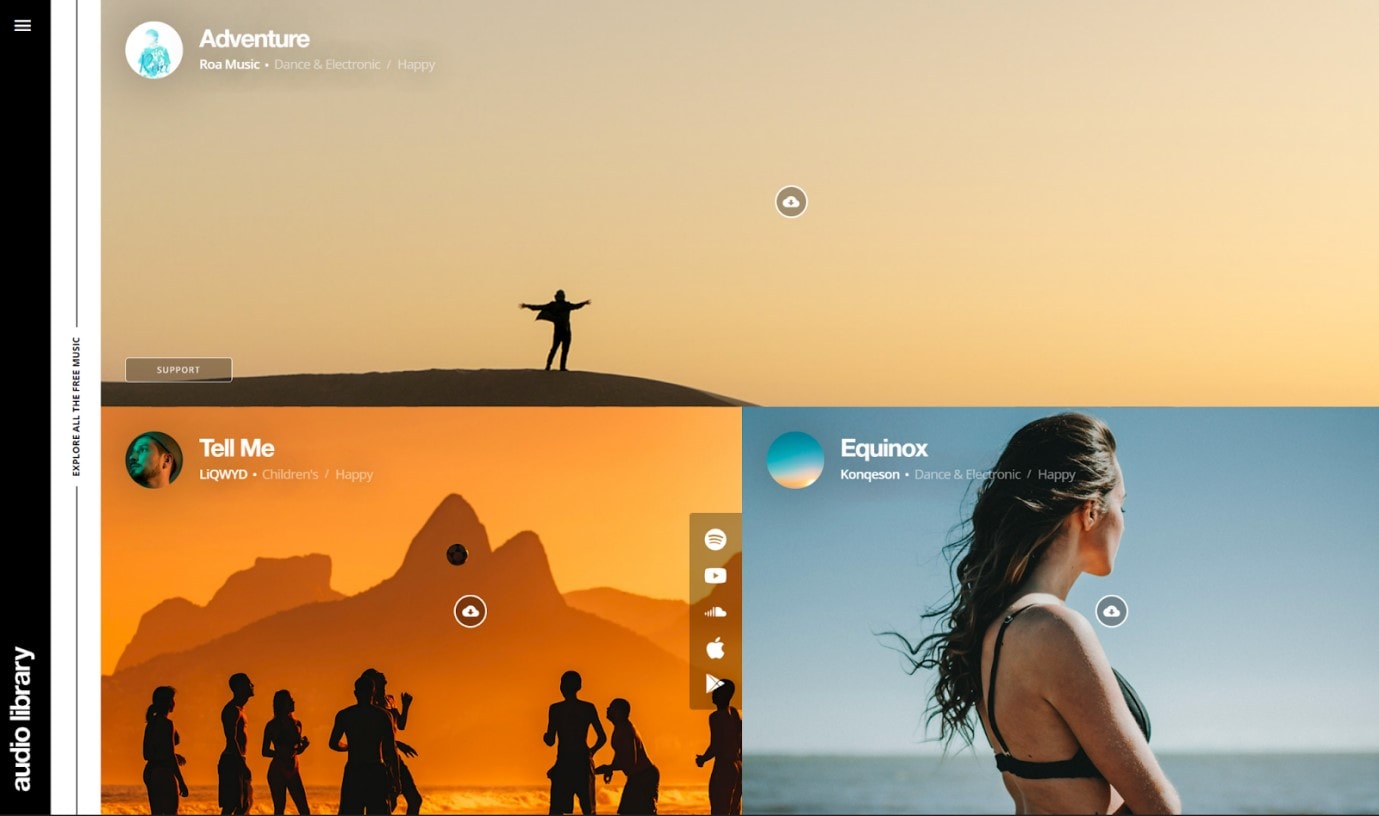
Many users are unaware that YouTube also has one of the biggest collections of royalty-free music that you can download and use for creative or artistic purposes. YouTube Audio Library allows you to search for royalty-free music by mood, track name, artist, or genre. So, regardless of the topic or theme of your podcast, you will find something suitable in its vast library.
Plus, you do not need any registrations or have to answer long questionnaires to access royalty-free music for podcast intros from the YouTube library. Instead, you can use the existing YouTube account to search, download, and use the music available on the platform.
Pros and Cons of YouTube Audio Library
Pros
- You can find music representing different themes, genres, moods, cultures, and so on.
- You can listen to the music on YouTube Audio Library or YouTube, SoundCloud, Apple Music, or Spotify.
- You do not have to open an account or sign up.
- YouTube Audio Library has one of the biggest collections of royalty-free music.
Cons
- You must support the artists via likes, shares, and subscriptions to download and use their music.
Ratings and User Reviews of YouTube Audio Library for Android
- G2 Rating: 7/ 5 (1 million+ user reviews)
- Trustpilot: 3/ 5 (726K user reviews)
- TrustRadius: 4.7/ 5 (400K+ user reviews)
User Review: “YouTube Audio Library has always satisfied all my music needs. The best thing: you do not need to pay even a dime to use professional-sounding music.”
2. Dig CCmixter –Free
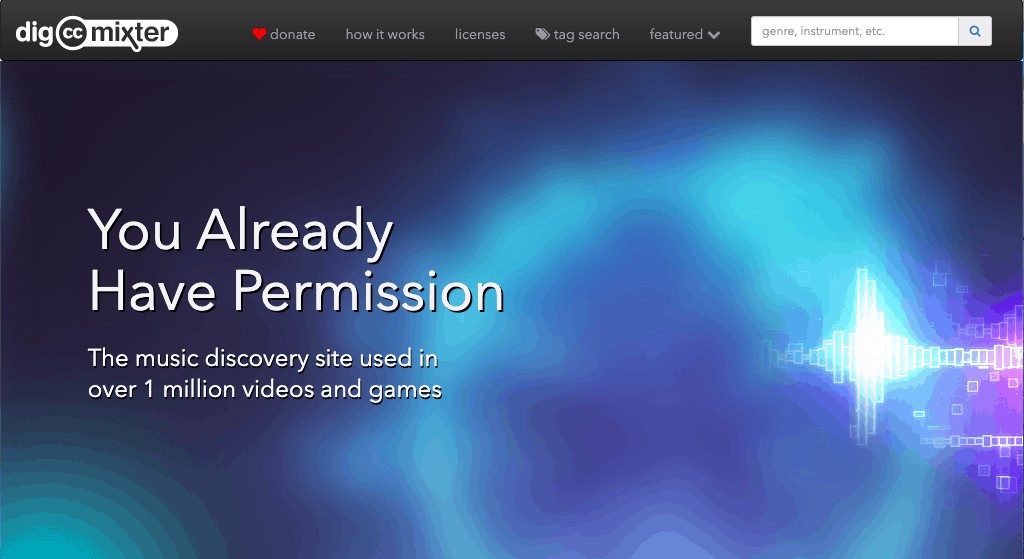
Another free platform, Dig CCmixter, is a community-supported platform that accepts music from musicians and allows users to download them for free. You do not have to tag the musician who created and uploaded the track to the Dig CCmixter library. An open internet utility, Dig CCmixter, does not even ask you to register on the site.
You can use tags to look for specific music genres and get a short list of types of music you need for your podcast. However, the Dig CCmixter site is unsecured; it isn’t a big concern, but most browsers (depending on your Settings) won’t allow you to access the site.
Still, if you can access the Dig CCmixter site, you will have one of the largest collections of royalty-free music that you can use to create podcast intros and outros.
Pros and Cons of Dig CCmixter:
Pros
- You can use music for free as long as you give credit.
- Broad music collection.
Cons
- The search functionality could be better.
- The website’s interface looks outdated.
Ratings and User Reviews of Dig CCmixter for Android:
- G2 Rating: 7/ 5 (1 million+ user reviews)
- Trustpilot: 3/ 5 (726K user reviews)
- TrustRadius: 4.7/ 5 (400K+ user reviews)
User Review: “YouTube Audio Library has always satisfied all my music needs. The best thing: you do not need to pay even a dime to use professional-sounding music.”
3. Free Music Archive – Free
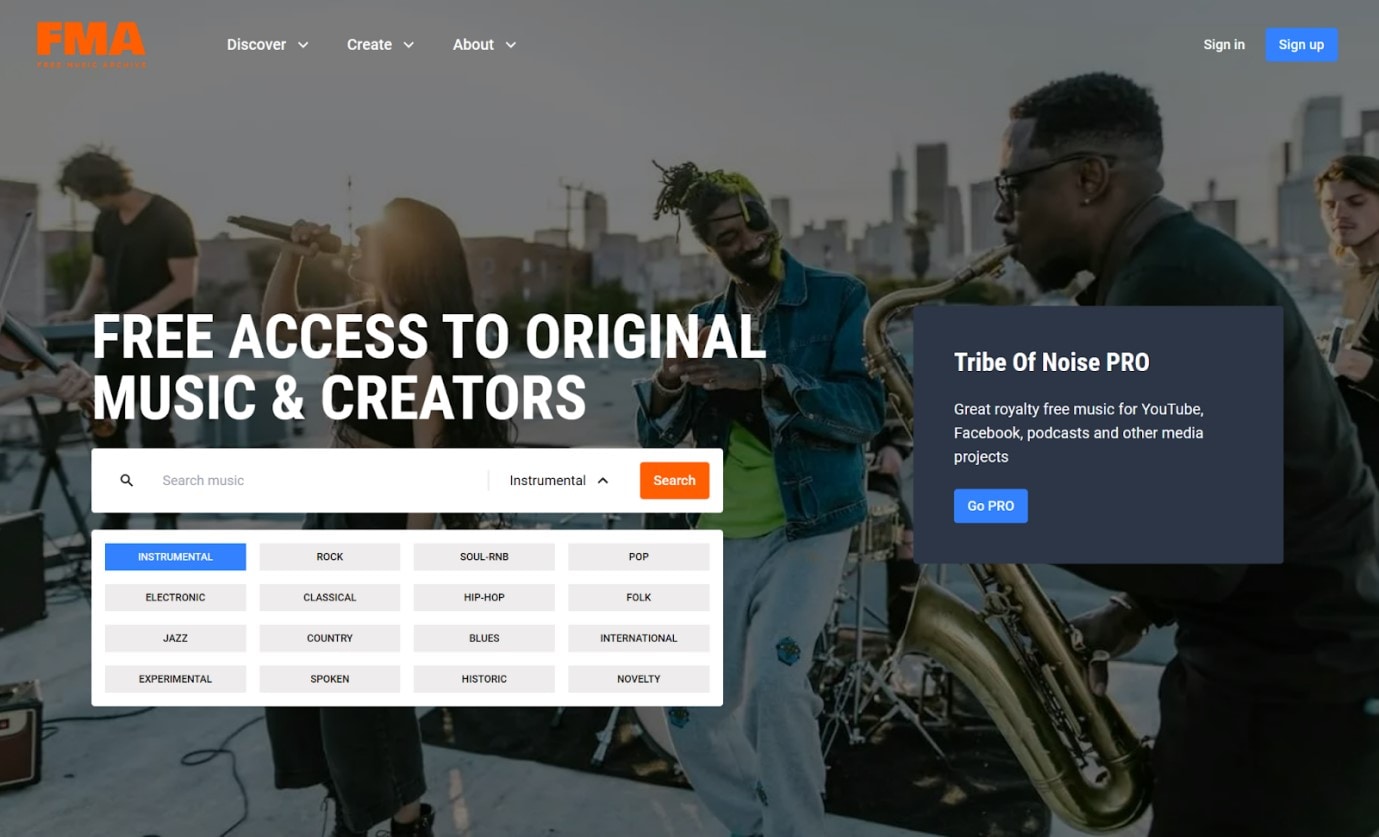
Free Music Archive, as the name indicates, is another site that presents free music for podcast intros and outro’s from independent creators and musicians worldwide.
You can find a piece of suitable music for podcast intros that will intrigue your users, from rock, jazz, reggae, or electronic. Another essential thing about Free Music Archive is that it gives you access to premium music service providers.
So in case you have the budget in the future, you can even access premium sites and find sophisticated tunes for your podcast created by professionals without having to find such places. Its interface is simple, and even technophobes can navigate the site seamlessly.
Pros and Cons of Free Music Archive
Pros
- The straightforward and navigable user interface on any device, including Android and iPhone.
- Free Music Archive allows you to search for music using tags, top downloads, artists, genres, featured mixes, and more.
- Instrumental, Rock, Soul-RnB, Pop, Electronic, Classical, Hip-hop, Folk, Jazz, Country, and more genres.
- It allows you to search even premium music content for podcasts.
Cons
- Registration is a must before downloading music from the site.
- Some creators demand you to tag them when you use their music in your podcast.
Ratings and User Reviews of Free Music Archive for Android
- G2 Rating: 3.6/5 (400 user reviews)
- **User Review: “**Free Music Archive makes life easier by giving me access to different types of music I need for my content.”
4. StockMusic – Subscription and track based
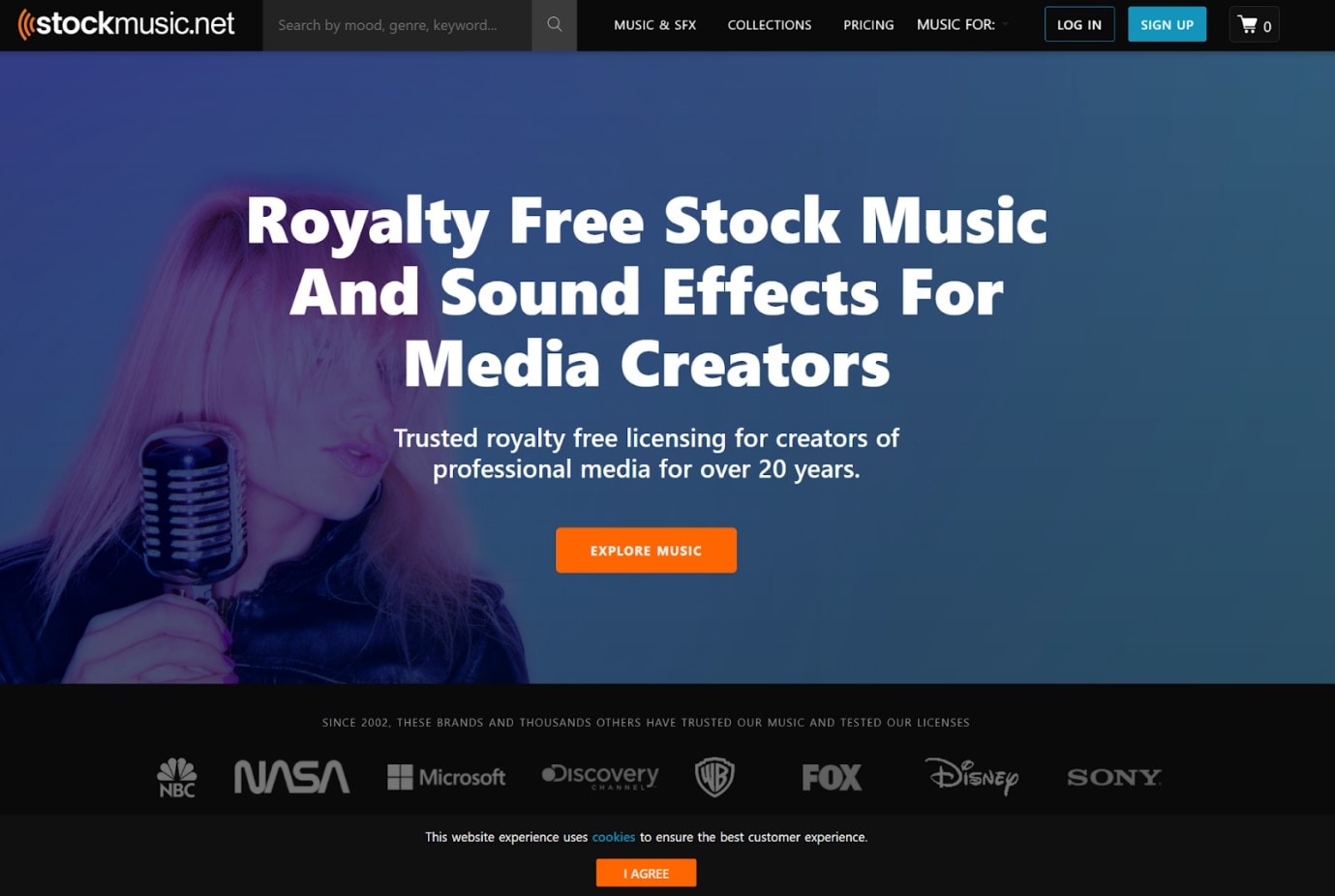
StochMusic has a simple concept, and it sells you music royalty in exchange for a subscription. For as little as US$ 16.69/mo, you can download as many soundtracks as you want for podcast intros. There is another subscription plan which also gives you access to unlimited sound effects besides soundtracks. Soundtracks are suitable for podcast creators looking to add podcast intros.
At the same time, the second plan will be helpful to creators that create story-based podcasts where sound effects add drama to voice and intrigue your users. StockMusic charges money for the music and sound effects because, unlike YouTube Audio Library and Free Music Archive, StockMusic includes music only from professionals. So, the music you get in return for your money is subpar and sounds professional.
Pros and Cons of StockMusic
Pros
- Filter by genre, mood, instruments, duration, and more to search for soundtracks and audio effects.
- Get a license for the music that you purchase on StockMusic and monetize. You can also sell the music to other parties. Transfer the license to someone else via the platform.
- Clean and simple user interface. The site is mobile-responsive, which works well even on mobile devices.
Cons
- Before downloading music from the site, you must register and subscribe to a plan.
Ratings and User Reviews of Free Music Archive for Android:
- G2 Rating: 3.6/5 (400 user reviews)
- **User Review: “**Free Music Archive makes life easier by giving me access to different types of music I need for my content.”
5. Sound Bible - Free
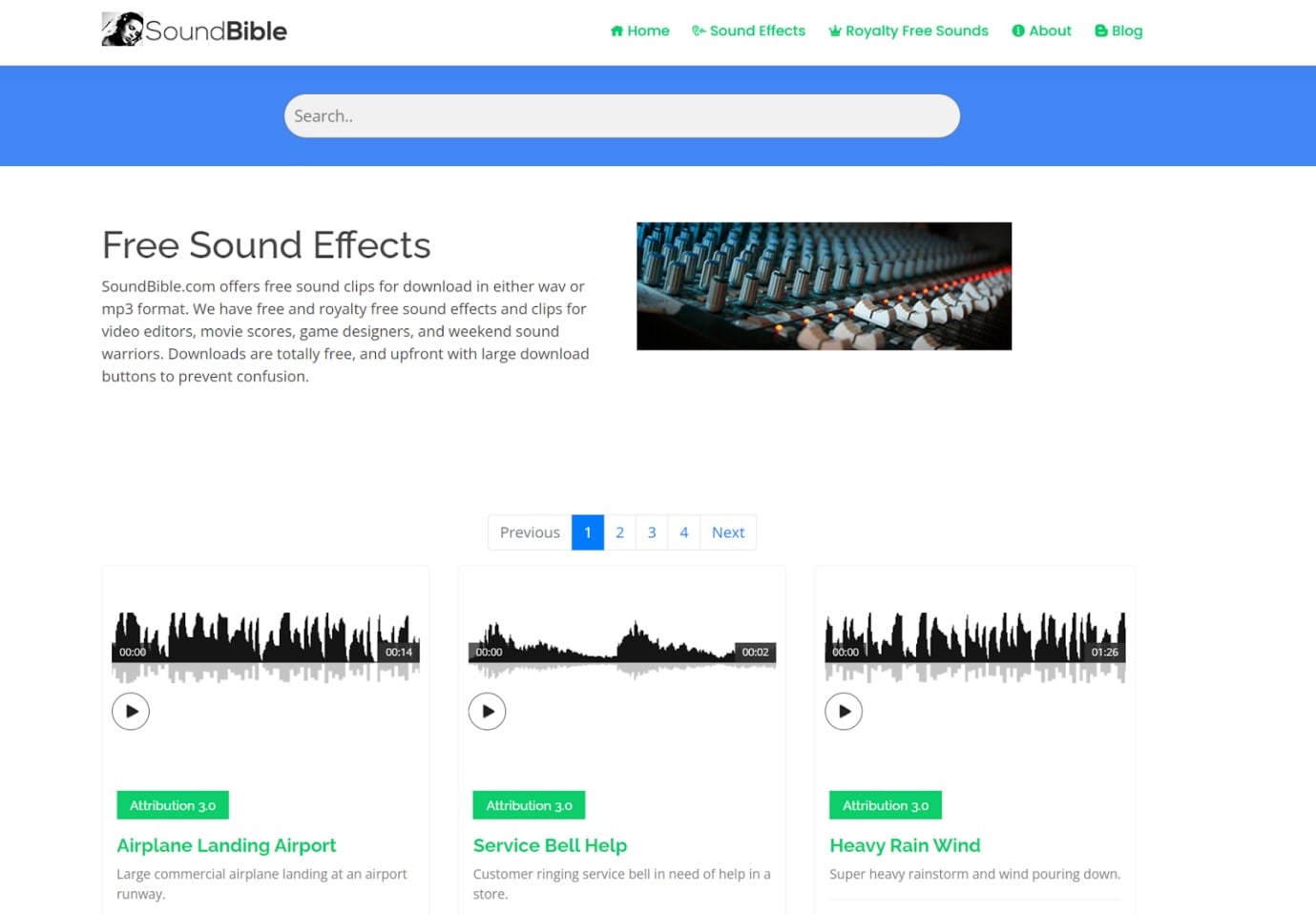
Sound Bible is another famous site that offers free clips in two audio formats: .wav and .mp3. And while thousands of free sound clips are available on the website, there are no tags or filters to search for the desired music. So, you must manually scroll through the website and locate the selected music without wasting time.
Besides music for podcast intro, you will also find royalty-free sound effects on the Sound Bible website. Coming to the website’s navigation, you can easily open, skip, and fast-forward sounds. Moreover, you can find all the music tracks on the YouTube Channel Sound Bible.
Pros and Cons of Sound Bible:
Pros
- All songs are available on both the website and YouTube channel of Sound Bible.
- All songs on the Sound Bible website are entirely free.
- You do not have to sign up to listen to or download music.
- Even though it is a free website, there are no annoying ads or banners.
Cons
- There are no filters to search for music by genre, mood, and other filters.
Ratings and User Reviews of Sound Bible for Android:
- G2 Rating: 3.6/5 (400 user reviews)
User Review: I love how the music is categorized. I can choose music based on a mood, which truly is incredible.
6. Filmora –Subscription-based
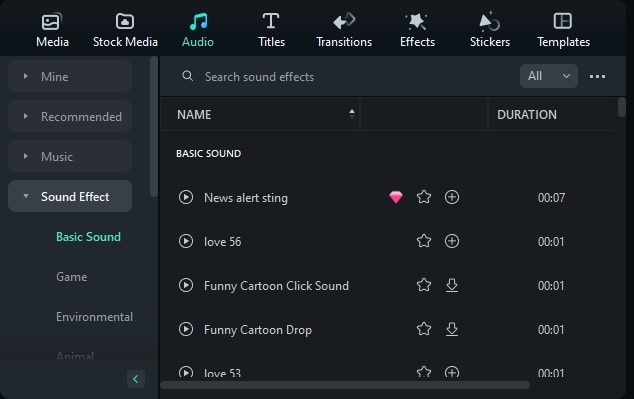
Free Download For Win 7 or later(64-bit)
Free Download For macOS 10.14 or later
If you are a podcast creator, you must have heard about Filmora. It packs everything you need to create professional-sounding podcasts. Filmora includes music tracks created by professional musicians. Also, it provides music relating to all genres and moods. So, there is a good chance you will find a suitable track for your podcast intros.
Pros and Cons of Filmora
Pros
- Filmora includes a lot of soundtracks and audio effects to tune your podcast professionally.
- Filmora’s AI Audio stretch allows you to retime music for podcast intro.
- Aside from royalty-free music, Filmora also gives you access to numerous other features.
- Simple interface that is convenient to use for even beginners. Dedicated iOS and Android applications are available.
Cons
- Subscription-based model.
Ratings and User Reviews of Filmora for Android:
- G2 Rating: 9/5 (36K user reviews)
- Trustpilot: 7/5 (43K user reviews)
- TrustRadius: 4.8/5 (22K user reviews)
User Review: “Filmora is one tool you need to curate all your multimedia, from Hollywood-style music to professional podcasts. It allows you to create just about anything.”
7. Artlist –Subscription-based
Artlist, like Filmora, is a video-cum-audio editor. However, it too includes over 300K pieces of music and audio effects that are enough to meet your needs. You can find sound and audio effects on any theme, genre, or topic.
The platform boasts a very minimal design, which makes finding quality music for various purposes pretty straightforward. Thankfully, it offers a filter feature that makes it easy for users to filter songs based on multiple criteria, including tempo, duration, the voice from the list, and many others.
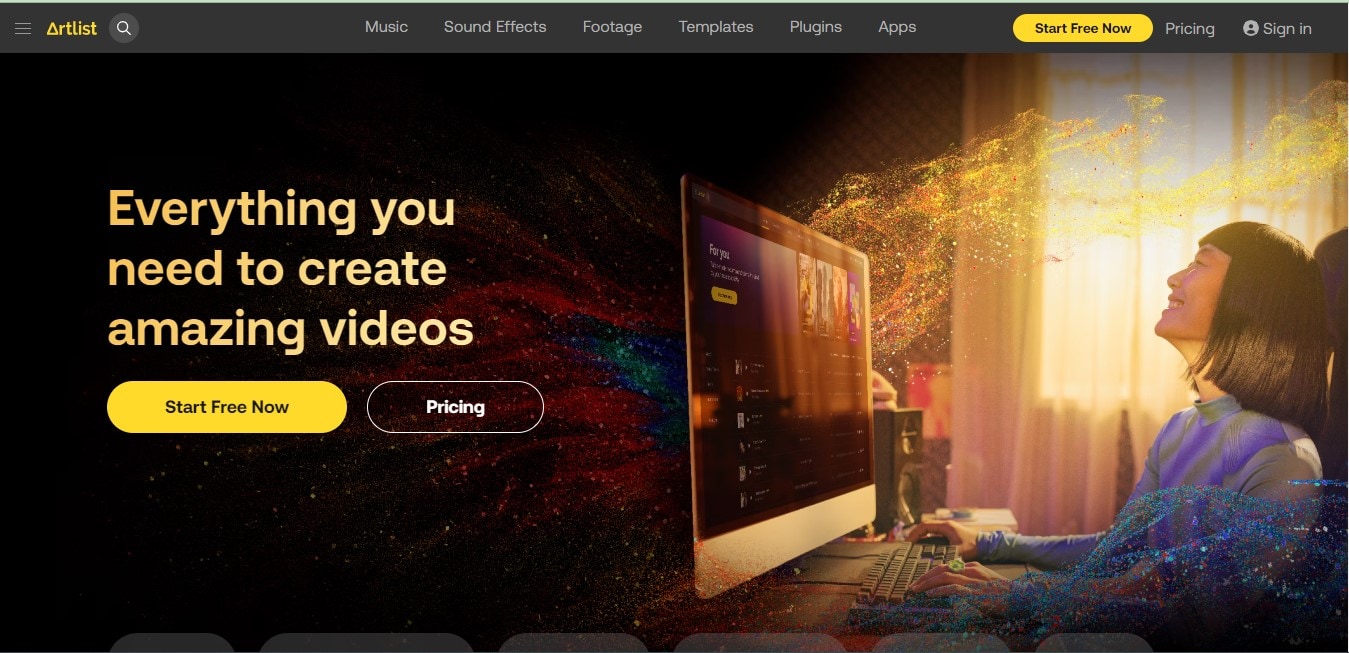
What’s more special about Artlist is that it provides users with detailed information about the artiste behind every music on the platform, making it easy to know the artiste behind whatever music you intend to use in your podcast. Overall, Artlist subscription-based model is highly professional and worth trying. Its subscription cost is also affordable compared to some of its competitors.
Pros and Cons of Artlist
Pros
- Excellent search feature.
- It only supports one worldwide license.
- Its cost of subscription is affordable.
- High-quality music.
- 14-day Money back guarantee.
- Simple UI.
Cons
- The music library could be better.
- Some tracks are not well categorized.
- Songs and SFX cannot be categorized.
Ratings and User Reviews of Artlist:
- G2 Rating: 7/5 (22 user reviews)
**User Review: “**What I like best about Artlist is the quality of the audio clips. There are many places where creators can get free music to use in their content, but free music usually equals poor-quality music. Artlist offers a huge selection of tracks by top artists in a massive variety of styles.”
8. Pond5 - Subscription Based
Pond5 is one of the platforms with a huge media library for anyone to explore. Moreover, the platform offers a wide range of music, be it inspirational, corporate, trailer, hip-hop, and lots more. Besides, thanks to its excellent search functionality, you can easily find pieces based on genre, mood, instrument, keyword, etc.
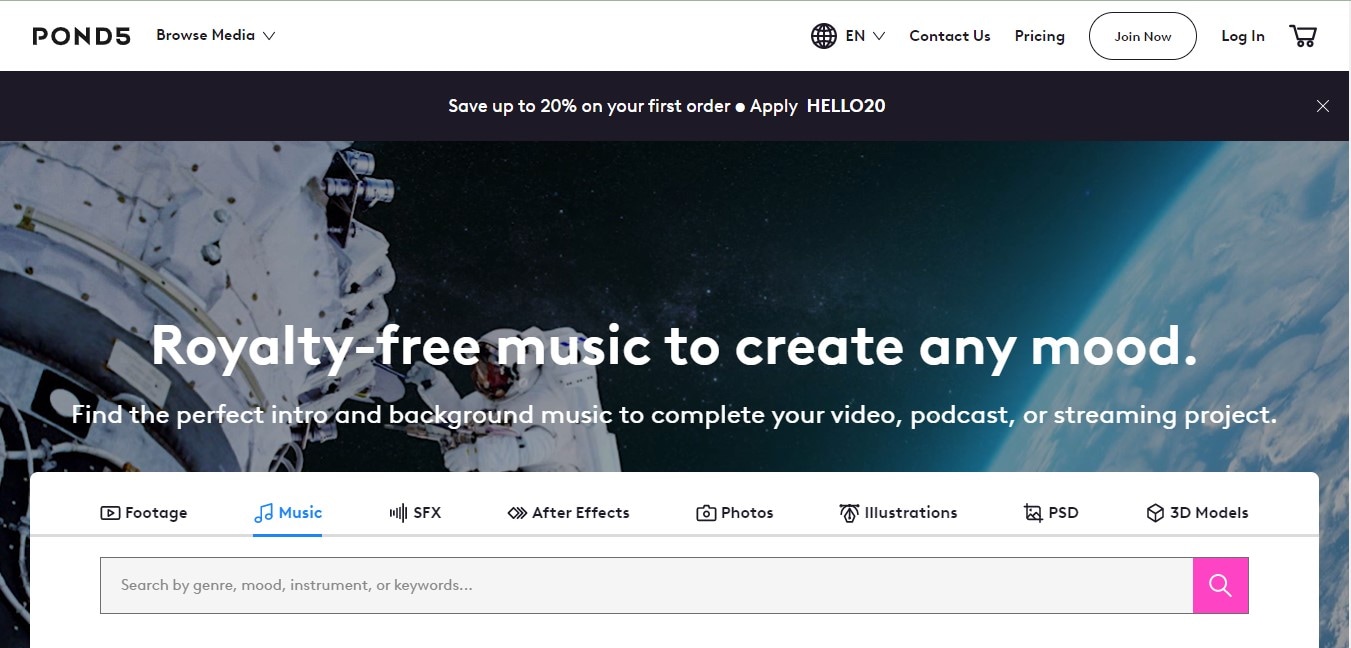
Overall, there are over 1.6 million music tracks for you to explore on Pond5. So, finding the ideal music for your podcast intro will be like a walk in the park when you have this platform at your disposal.
Pros and COns of Pond5
Pros
- A better choice for picking music for a podcast intro.
- Extensive library of sound effects.
Cons
- The website can sometimes be slow.
- The license is somewhat expensive.
Ratings and User Reviews of Pond5
G2 Rating: 4.3/5 (33 User Review)
User Review: “When I need the right clip, photo, or song, I go to Pond5. Even though it’s great to get things for free from other services, I usually spend five times the amount of time trying to find something that fits my needs. And for a meager cost, I can skip all that search time and get what I need for my project.”
9. AudioJungle - Track Based
Having been in the game since 2008 and boasting over 1.3 million tracks and sound effects, Audio Jungle is one of the good places you can always count on to find the right music for your podcast intro.
Here, you can browse a wide range of royalty-free music based on various criteria, including genre, BMP, mood, price, or tempo. Plus, all music tracks on the platform are highly-affordable.
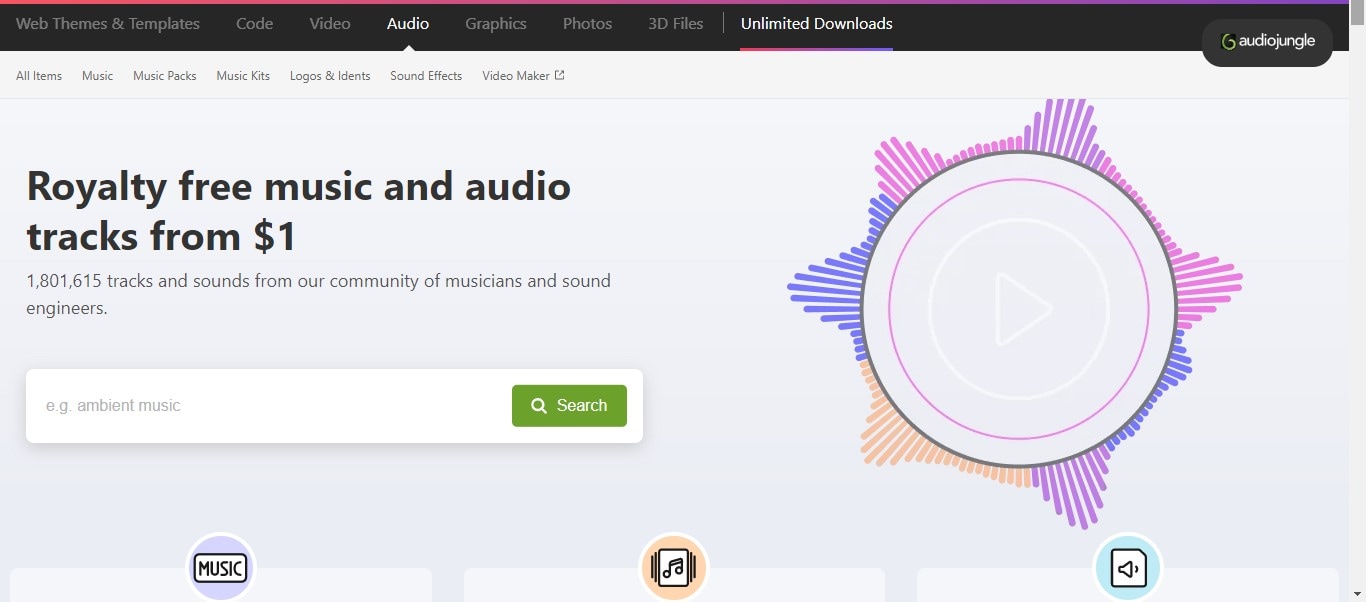
You can’t go wrong using a platform like Audio Jungle to find the ideal music for your podcast intro. The only problem is that the licensing process for music on the platform is not straightforward, and the website’s interface feels outdated.
Pros and Cons of AudioJungle
Pros
- It boasts an extensive music library.
- It supports a reliable search function that allows you to browse music based on various criteria.
- Many promotional discounts are available.
- You can filter music based on tempo.
Cons
- The website interface could be better.
- The licensing process is confusing.
Ratings and User Reviews of AudioJungle
- G2 Rating: 4/5 (37 user reviews)
**User Review: “**I like the best Audio Jungle features: Royalty-free audio file access for spending a few dollars. It’s a viral website for stock audio buying and selling. This website offers me many kinds of music, which I can buy from them with a license. I many times buy music from Audio Jungle for my websites and videos. It’s a very amazing and helpful website. I can also download millions of assets from Envato Elements.”
10. Premium Beat - Track Based
Premium Beat is also a good royalty-free music website to find excellent music for podcast intros. The website gives you access to high-quality music and sound effect that can come in handy for various purposes. Thanks to its simple interface, you don’t necessarily need advanced knowledge to navigate and find the right music for your podcast.
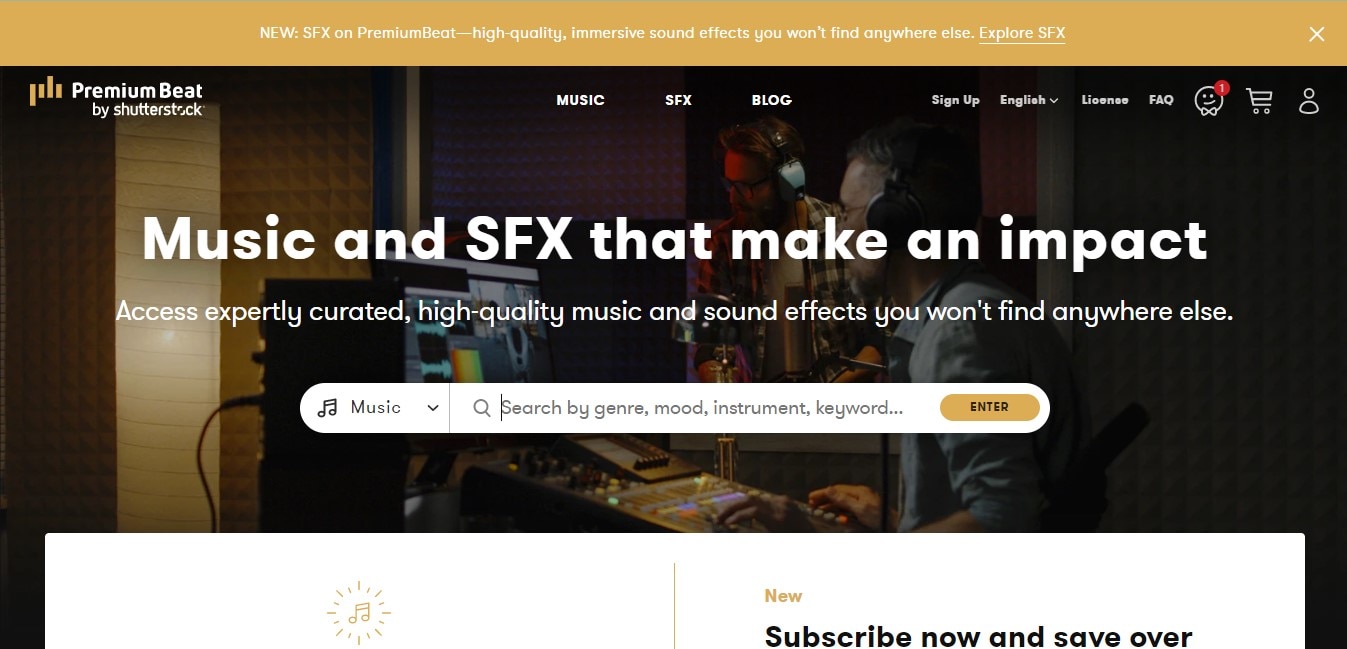
Also, PremiumBeat has a good search tool that allows you to find the music you need by genre, keywords, mood, instrument, and lots more. Besides, you can get up to five monthly tracks once you complete your subscription. The music tracks on the website are also copyright free!
Pros and Cons of Premium Beat
Pros
- Clean and intuitive user interface.
- You can access sound effects for free.
- It supports many unique features, like the mood category, to spice up user searching.
Cons
- The cost of a subscription is pretty expensive. For example, one track costs $99, even if you have billed monthly.
Ratings and User Reviews of Premium Beat
- G2 Rating: 3/5 (12 user reviews)
**User Review: “**One of the biggest attractions is its wide range of genres and music libraries. There are also many categories for moods and instrumental modes that you can’t avoid. Also, the music is of great quality.”
Legal Tips For Podcast Intro Music
Good podcast intro music does not necessarily mean you have to pay an astronomically high price. On the contrary, you can get music for podcast intros even for free without crediting the musician. However, it is essential to understand how to avoid legal troubles. In other words, understand what is considered legal and illegal or illegitimate use.
Retain that even using non-copyrighted music can sometimes land you in legal trouble, so it is better to know how to avoid it when using non-copyrighted or copyrighted music. Here are the factors that you should always consider when choosing to include any piece in your podcast:
- Always get permission in writing and transfer or license. Even when you are using royalty-free music for podcast intros, ensure to have some written proof that you’ve received permission to use the track in your podcast.
- Ensure that the transfer license or written permission covers the publisher and creators’ names to avoid legal troubles. Usually, royalty-free music providers bundle all these details together, so you are fine. Still, ensure that the transfer license includes this information.
- If your podcast plays worldwide, you will need permission from the authors to use the music in all countries. Otherwise, the use of music can be subjected to perpetuity. That is, you might have permission to use the music tracks in some parts of the world but not the entire world. So, ensure to take permission to use the music track worldwide.
- Don’t use a music track multiple times, even if you have received permission to use it only once. These distinctions are crucial to specify.
- Remember the terms and conditions mentioned on the royalty-free music distribution services. For instance, some Creative Commons licenses come with the situation that you must credit the creator. In case you violate the rule, the music will be considered copyrighted.
- When you take music from a freelancer, or it is personally made for your podcast on a special request by you, ensure that the creator owns all the rights. In several cases, podcast creators have had to pay for the freelancer’s mistakes. You can sign a contract with the freelancer and ensure that it is composed initially, not copied from some other music.
Typical Music for Podcast Intro Questions, Answered
1. Is it OK to only use a few seconds of a copyrighted song?
No. It will violate copyright laws, and your podcast might be under scrutiny for copyright infringement. Just retain that even a second of copyrighted music can get your podcast banned, or you may get fined by the creator. When using music in professional environments, it is better to avoid copyrighted music created by professionals.
2. What happens if I receive a copyright infringement notice?
Copyright infringement notices are given to bring it to your attention that you’re using someone else’s music. Such notices are the best way to handle copyright infringement as the matter can be settled outside the court, usually with fines.
So, avoiding using copyrighted music in your podcasts is best.
3. Can I use their music if my podcast is about reviewing songs or artists?
Yes. If your podcast revolves around criticism, education, media, reporting, or researching, then using copyrighted materials comes into “fair use” practice. Nevertheless, it is better to ask permission from the creators beforehand, as judicial scrutiny can be against your favor.
There are four cycles in which copyrighted music will be evaluated as fair use. They are:
- The character and purpose of use of the copyrighted music.
- The nature of copyrighted music and your work.
- The amount and substantiality of the portion taken, i.e., whether it is genuine or not.
- The effect of using copyrighted music in the potential market.
Judges will evaluate the use of music based on these four principles step-by-step. If the use of copyright passes each step, it will be considered fair use. Otherwise, the use of music will be regarded as illegal, and you may get fined or imprisoned.
Summing up
The main aim of this guide was to inform you about the sites that have royalty-free music for podcast intros so that you can use music in your podcast intros without legal problems.
The problem is that many podcast creators are unaware that they cannot use copyrighted music. And this often results in a ban on the podcast or huge fines.
However, you now have all the information regarding how and where to use music for podcast intros. Always use only non-copyrighted music so you do not face such problems.
Part 1. What Kind of Music Can You Use for the Podcast Intro?
Various types of music can be used for podcast intros, including creative common music, royalty-free music, and public domain music. So, whether you’re looking to use vocals or special music as an intro for your podcast show, it’s crucial you understand these different types of music, as it’ll save you from violating copyright laws that could compromise your podcast show’s reputation online.
Creative Common Music (Free to use)
Creative Common Music is music tracks where the artist gives users 100% freedom to use it without permission. It’s a type of music with no copyright. But you might be required to provide credit to the artist. So please read the terms and conditions attached to any creative common music before using it.
Royalty-Free Music (Paid)
Royalty-Free Music is the opposite of Creative Common Music. To use such music, you need to have a subscription on the website or make a one-time payment to have 100% right to use it in your podcast intro. In addition, such music is usually subjected to copyright. So, using it without permission will risk your podcast show’s reputation.
Public Domain Music (Free to use)
Public Domain Music is music with an expired copyright license published in a public domain where you can use them for free without permission or giving credit. For example, in the United States, music works published in 1926 or earlier are Public Domain Music.
Part 2. 10 Places To Get Music for Your Podcast Intros
A professional-sounding podcast starts with intro music and uses songs to move the story forward. Now you have a brief understanding of the kind of music you can use for a podcast intro, let’s dive into the list of the top 10 places to get music for your podcast intro.
1. YouTube Audio Library

Many users are unaware that YouTube also has one of the biggest collections of royalty-free music that you can download and use for creative or artistic purposes. YouTube Audio Library allows you to search for royalty-free music by mood, track name, artist, or genre. So, regardless of the topic or theme of your podcast, you will find something suitable in its vast library.
Plus, you do not need any registrations or have to answer long questionnaires to access royalty-free music for podcast intros from the YouTube library. Instead, you can use the existing YouTube account to search, download, and use the music available on the platform.
Pros and Cons of YouTube Audio Library
Pros
- You can find music representing different themes, genres, moods, cultures, and so on.
- You can listen to the music on YouTube Audio Library or YouTube, SoundCloud, Apple Music, or Spotify.
- You do not have to open an account or sign up.
- YouTube Audio Library has one of the biggest collections of royalty-free music.
Cons
- You must support the artists via likes, shares, and subscriptions to download and use their music.
Ratings and User Reviews of YouTube Audio Library for Android
- G2 Rating: 7/ 5 (1 million+ user reviews)
- Trustpilot: 3/ 5 (726K user reviews)
- TrustRadius: 4.7/ 5 (400K+ user reviews)
User Review: “YouTube Audio Library has always satisfied all my music needs. The best thing: you do not need to pay even a dime to use professional-sounding music.”
2. Dig CCmixter –Free

Another free platform, Dig CCmixter, is a community-supported platform that accepts music from musicians and allows users to download them for free. You do not have to tag the musician who created and uploaded the track to the Dig CCmixter library. An open internet utility, Dig CCmixter, does not even ask you to register on the site.
You can use tags to look for specific music genres and get a short list of types of music you need for your podcast. However, the Dig CCmixter site is unsecured; it isn’t a big concern, but most browsers (depending on your Settings) won’t allow you to access the site.
Still, if you can access the Dig CCmixter site, you will have one of the largest collections of royalty-free music that you can use to create podcast intros and outros.
Pros and Cons of Dig CCmixter:
Pros
- You can use music for free as long as you give credit.
- Broad music collection.
Cons
- The search functionality could be better.
- The website’s interface looks outdated.
Ratings and User Reviews of Dig CCmixter for Android:
- G2 Rating: 7/ 5 (1 million+ user reviews)
- Trustpilot: 3/ 5 (726K user reviews)
- TrustRadius: 4.7/ 5 (400K+ user reviews)
User Review: “YouTube Audio Library has always satisfied all my music needs. The best thing: you do not need to pay even a dime to use professional-sounding music.”
3. Free Music Archive – Free

Free Music Archive, as the name indicates, is another site that presents free music for podcast intros and outro’s from independent creators and musicians worldwide.
You can find a piece of suitable music for podcast intros that will intrigue your users, from rock, jazz, reggae, or electronic. Another essential thing about Free Music Archive is that it gives you access to premium music service providers.
So in case you have the budget in the future, you can even access premium sites and find sophisticated tunes for your podcast created by professionals without having to find such places. Its interface is simple, and even technophobes can navigate the site seamlessly.
Pros and Cons of Free Music Archive
Pros
- The straightforward and navigable user interface on any device, including Android and iPhone.
- Free Music Archive allows you to search for music using tags, top downloads, artists, genres, featured mixes, and more.
- Instrumental, Rock, Soul-RnB, Pop, Electronic, Classical, Hip-hop, Folk, Jazz, Country, and more genres.
- It allows you to search even premium music content for podcasts.
Cons
- Registration is a must before downloading music from the site.
- Some creators demand you to tag them when you use their music in your podcast.
Ratings and User Reviews of Free Music Archive for Android
- G2 Rating: 3.6/5 (400 user reviews)
- **User Review: “**Free Music Archive makes life easier by giving me access to different types of music I need for my content.”
4. StockMusic – Subscription and track based

StochMusic has a simple concept, and it sells you music royalty in exchange for a subscription. For as little as US$ 16.69/mo, you can download as many soundtracks as you want for podcast intros. There is another subscription plan which also gives you access to unlimited sound effects besides soundtracks. Soundtracks are suitable for podcast creators looking to add podcast intros.
At the same time, the second plan will be helpful to creators that create story-based podcasts where sound effects add drama to voice and intrigue your users. StockMusic charges money for the music and sound effects because, unlike YouTube Audio Library and Free Music Archive, StockMusic includes music only from professionals. So, the music you get in return for your money is subpar and sounds professional.
Pros and Cons of StockMusic
Pros
- Filter by genre, mood, instruments, duration, and more to search for soundtracks and audio effects.
- Get a license for the music that you purchase on StockMusic and monetize. You can also sell the music to other parties. Transfer the license to someone else via the platform.
- Clean and simple user interface. The site is mobile-responsive, which works well even on mobile devices.
Cons
- Before downloading music from the site, you must register and subscribe to a plan.
Ratings and User Reviews of Free Music Archive for Android:
- G2 Rating: 3.6/5 (400 user reviews)
- **User Review: “**Free Music Archive makes life easier by giving me access to different types of music I need for my content.”
5. Sound Bible - Free

Sound Bible is another famous site that offers free clips in two audio formats: .wav and .mp3. And while thousands of free sound clips are available on the website, there are no tags or filters to search for the desired music. So, you must manually scroll through the website and locate the selected music without wasting time.
Besides music for podcast intro, you will also find royalty-free sound effects on the Sound Bible website. Coming to the website’s navigation, you can easily open, skip, and fast-forward sounds. Moreover, you can find all the music tracks on the YouTube Channel Sound Bible.
Pros and Cons of Sound Bible:
Pros
- All songs are available on both the website and YouTube channel of Sound Bible.
- All songs on the Sound Bible website are entirely free.
- You do not have to sign up to listen to or download music.
- Even though it is a free website, there are no annoying ads or banners.
Cons
- There are no filters to search for music by genre, mood, and other filters.
Ratings and User Reviews of Sound Bible for Android:
- G2 Rating: 3.6/5 (400 user reviews)
User Review: I love how the music is categorized. I can choose music based on a mood, which truly is incredible.
6. Filmora –Subscription-based

Free Download For Win 7 or later(64-bit)
Free Download For macOS 10.14 or later
If you are a podcast creator, you must have heard about Filmora. It packs everything you need to create professional-sounding podcasts. Filmora includes music tracks created by professional musicians. Also, it provides music relating to all genres and moods. So, there is a good chance you will find a suitable track for your podcast intros.
Pros and Cons of Filmora
Pros
- Filmora includes a lot of soundtracks and audio effects to tune your podcast professionally.
- Filmora’s AI Audio stretch allows you to retime music for podcast intro.
- Aside from royalty-free music, Filmora also gives you access to numerous other features.
- Simple interface that is convenient to use for even beginners. Dedicated iOS and Android applications are available.
Cons
- Subscription-based model.
Ratings and User Reviews of Filmora for Android:
- G2 Rating: 9/5 (36K user reviews)
- Trustpilot: 7/5 (43K user reviews)
- TrustRadius: 4.8/5 (22K user reviews)
User Review: “Filmora is one tool you need to curate all your multimedia, from Hollywood-style music to professional podcasts. It allows you to create just about anything.”
7. Artlist –Subscription-based
Artlist, like Filmora, is a video-cum-audio editor. However, it too includes over 300K pieces of music and audio effects that are enough to meet your needs. You can find sound and audio effects on any theme, genre, or topic.
The platform boasts a very minimal design, which makes finding quality music for various purposes pretty straightforward. Thankfully, it offers a filter feature that makes it easy for users to filter songs based on multiple criteria, including tempo, duration, the voice from the list, and many others.

What’s more special about Artlist is that it provides users with detailed information about the artiste behind every music on the platform, making it easy to know the artiste behind whatever music you intend to use in your podcast. Overall, Artlist subscription-based model is highly professional and worth trying. Its subscription cost is also affordable compared to some of its competitors.
Pros and Cons of Artlist
Pros
- Excellent search feature.
- It only supports one worldwide license.
- Its cost of subscription is affordable.
- High-quality music.
- 14-day Money back guarantee.
- Simple UI.
Cons
- The music library could be better.
- Some tracks are not well categorized.
- Songs and SFX cannot be categorized.
Ratings and User Reviews of Artlist:
- G2 Rating: 7/5 (22 user reviews)
**User Review: “**What I like best about Artlist is the quality of the audio clips. There are many places where creators can get free music to use in their content, but free music usually equals poor-quality music. Artlist offers a huge selection of tracks by top artists in a massive variety of styles.”
8. Pond5 - Subscription Based
Pond5 is one of the platforms with a huge media library for anyone to explore. Moreover, the platform offers a wide range of music, be it inspirational, corporate, trailer, hip-hop, and lots more. Besides, thanks to its excellent search functionality, you can easily find pieces based on genre, mood, instrument, keyword, etc.

Overall, there are over 1.6 million music tracks for you to explore on Pond5. So, finding the ideal music for your podcast intro will be like a walk in the park when you have this platform at your disposal.
Pros and COns of Pond5
Pros
- A better choice for picking music for a podcast intro.
- Extensive library of sound effects.
Cons
- The website can sometimes be slow.
- The license is somewhat expensive.
Ratings and User Reviews of Pond5
G2 Rating: 4.3/5 (33 User Review)
User Review: “When I need the right clip, photo, or song, I go to Pond5. Even though it’s great to get things for free from other services, I usually spend five times the amount of time trying to find something that fits my needs. And for a meager cost, I can skip all that search time and get what I need for my project.”
9. AudioJungle - Track Based
Having been in the game since 2008 and boasting over 1.3 million tracks and sound effects, Audio Jungle is one of the good places you can always count on to find the right music for your podcast intro.
Here, you can browse a wide range of royalty-free music based on various criteria, including genre, BMP, mood, price, or tempo. Plus, all music tracks on the platform are highly-affordable.

You can’t go wrong using a platform like Audio Jungle to find the ideal music for your podcast intro. The only problem is that the licensing process for music on the platform is not straightforward, and the website’s interface feels outdated.
Pros and Cons of AudioJungle
Pros
- It boasts an extensive music library.
- It supports a reliable search function that allows you to browse music based on various criteria.
- Many promotional discounts are available.
- You can filter music based on tempo.
Cons
- The website interface could be better.
- The licensing process is confusing.
Ratings and User Reviews of AudioJungle
- G2 Rating: 4/5 (37 user reviews)
**User Review: “**I like the best Audio Jungle features: Royalty-free audio file access for spending a few dollars. It’s a viral website for stock audio buying and selling. This website offers me many kinds of music, which I can buy from them with a license. I many times buy music from Audio Jungle for my websites and videos. It’s a very amazing and helpful website. I can also download millions of assets from Envato Elements.”
10. Premium Beat - Track Based
Premium Beat is also a good royalty-free music website to find excellent music for podcast intros. The website gives you access to high-quality music and sound effect that can come in handy for various purposes. Thanks to its simple interface, you don’t necessarily need advanced knowledge to navigate and find the right music for your podcast.

Also, PremiumBeat has a good search tool that allows you to find the music you need by genre, keywords, mood, instrument, and lots more. Besides, you can get up to five monthly tracks once you complete your subscription. The music tracks on the website are also copyright free!
Pros and Cons of Premium Beat
Pros
- Clean and intuitive user interface.
- You can access sound effects for free.
- It supports many unique features, like the mood category, to spice up user searching.
Cons
- The cost of a subscription is pretty expensive. For example, one track costs $99, even if you have billed monthly.
Ratings and User Reviews of Premium Beat
- G2 Rating: 3/5 (12 user reviews)
**User Review: “**One of the biggest attractions is its wide range of genres and music libraries. There are also many categories for moods and instrumental modes that you can’t avoid. Also, the music is of great quality.”
Legal Tips For Podcast Intro Music
Good podcast intro music does not necessarily mean you have to pay an astronomically high price. On the contrary, you can get music for podcast intros even for free without crediting the musician. However, it is essential to understand how to avoid legal troubles. In other words, understand what is considered legal and illegal or illegitimate use.
Retain that even using non-copyrighted music can sometimes land you in legal trouble, so it is better to know how to avoid it when using non-copyrighted or copyrighted music. Here are the factors that you should always consider when choosing to include any piece in your podcast:
- Always get permission in writing and transfer or license. Even when you are using royalty-free music for podcast intros, ensure to have some written proof that you’ve received permission to use the track in your podcast.
- Ensure that the transfer license or written permission covers the publisher and creators’ names to avoid legal troubles. Usually, royalty-free music providers bundle all these details together, so you are fine. Still, ensure that the transfer license includes this information.
- If your podcast plays worldwide, you will need permission from the authors to use the music in all countries. Otherwise, the use of music can be subjected to perpetuity. That is, you might have permission to use the music tracks in some parts of the world but not the entire world. So, ensure to take permission to use the music track worldwide.
- Don’t use a music track multiple times, even if you have received permission to use it only once. These distinctions are crucial to specify.
- Remember the terms and conditions mentioned on the royalty-free music distribution services. For instance, some Creative Commons licenses come with the situation that you must credit the creator. In case you violate the rule, the music will be considered copyrighted.
- When you take music from a freelancer, or it is personally made for your podcast on a special request by you, ensure that the creator owns all the rights. In several cases, podcast creators have had to pay for the freelancer’s mistakes. You can sign a contract with the freelancer and ensure that it is composed initially, not copied from some other music.
Typical Music for Podcast Intro Questions, Answered
1. Is it OK to only use a few seconds of a copyrighted song?
No. It will violate copyright laws, and your podcast might be under scrutiny for copyright infringement. Just retain that even a second of copyrighted music can get your podcast banned, or you may get fined by the creator. When using music in professional environments, it is better to avoid copyrighted music created by professionals.
2. What happens if I receive a copyright infringement notice?
Copyright infringement notices are given to bring it to your attention that you’re using someone else’s music. Such notices are the best way to handle copyright infringement as the matter can be settled outside the court, usually with fines.
So, avoiding using copyrighted music in your podcasts is best.
3. Can I use their music if my podcast is about reviewing songs or artists?
Yes. If your podcast revolves around criticism, education, media, reporting, or researching, then using copyrighted materials comes into “fair use” practice. Nevertheless, it is better to ask permission from the creators beforehand, as judicial scrutiny can be against your favor.
There are four cycles in which copyrighted music will be evaluated as fair use. They are:
- The character and purpose of use of the copyrighted music.
- The nature of copyrighted music and your work.
- The amount and substantiality of the portion taken, i.e., whether it is genuine or not.
- The effect of using copyrighted music in the potential market.
Judges will evaluate the use of music based on these four principles step-by-step. If the use of copyright passes each step, it will be considered fair use. Otherwise, the use of music will be regarded as illegal, and you may get fined or imprisoned.
Summing up
The main aim of this guide was to inform you about the sites that have royalty-free music for podcast intros so that you can use music in your podcast intros without legal problems.
The problem is that many podcast creators are unaware that they cannot use copyrighted music. And this often results in a ban on the podcast or huge fines.
However, you now have all the information regarding how and where to use music for podcast intros. Always use only non-copyrighted music so you do not face such problems.
Also read:
- [New] 2024 Approved The Ultimate Guide to Mobile Image Mastery
- [Updated] In 2024, The Director of Dishes Behind-the-Scenes of Food Filming
- 2024 Approved Achieve Marketing Excellence The Top 10 Steps to Mastering SMM
- 2024 Approved Audience's Take GoPro Hero5 Footage
- 2024 Approved Dissecting Video Ranking Algorithms on YouTube
- 5 Ways to Transfer Music from Poco X6 to Other Android Devices Easily | Dr.fone
- Auditory Ambience Finder For Film and Video Sets
- Behind the Numbers Earnings in Podcasting
- Decoding Automatic High Dynamic Range (Auto HDR) in Windows 11
- Decoding the Capabilities of Claude Pro Versus The Advantages of ChatGPT Plus
- High-Quality Streaming Showdown Who's Your Favorite, VMix/Wirecast for 2024
- In 2024, How Can I Catch the Regional Pokémon without Traveling On Tecno Phantom V Fold | Dr.fone
- In 2024, Streamline Your Screens The Essential Online Record Guide
- Navigating the Metaverse with Elite Headsets
- Photographs Dancing to Musical Rhythms
- Title: Podcast Introscape Audiophile's Melodic Treasure Trove
- Author: Paul
- Created at : 2024-12-10 20:13:56
- Updated at : 2024-12-14 19:03:59
- Link: https://extra-information.techidaily.com/podcast-introscape-audiophiles-melodic-treasure-trove/
- License: This work is licensed under CC BY-NC-SA 4.0.